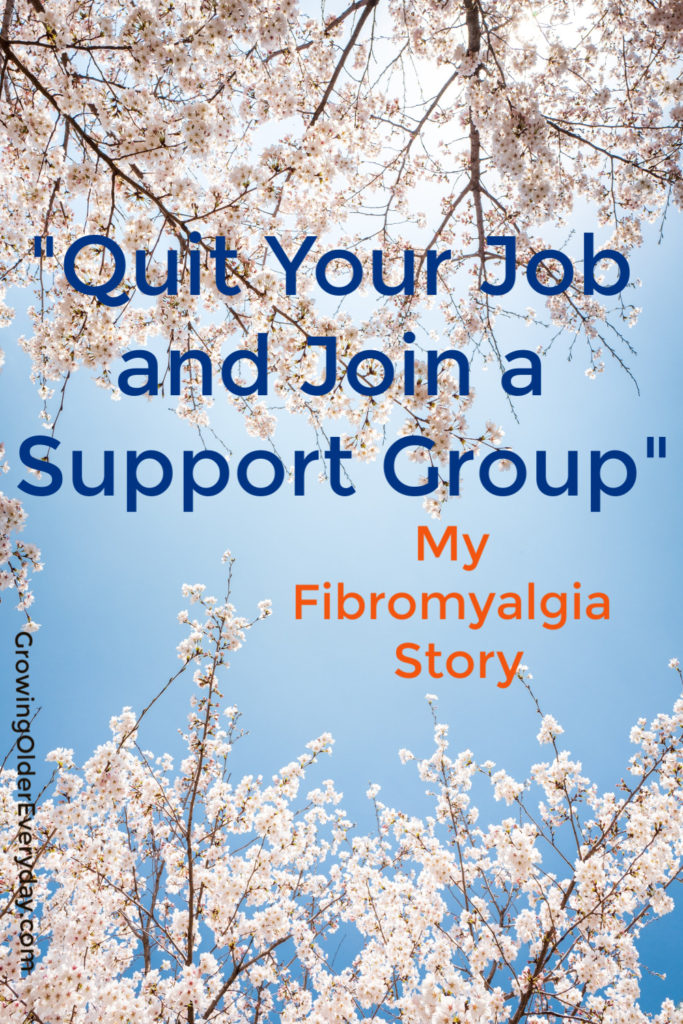

Have you every had one of those terrible days, when you hope you will soon wake up from the nightmare? Mine happened eighteen years ago.
I was sitting on the exam table in a specialist’s office about 30 minutes from my home when he diagnosed me with something I had never hear of before. His sage advice – quit your job and join a support group. Excuse me, my son was a senior in high school and my daughter a junior at college. I had two kids going to pricey Christian schools, quitting my job was not an option. Support group, did such a thing really exist for this? And what in the world was this Fibromyalgia thing he said I had anyway?
I walked out of there with a packet of information, still not sure how to pronounce what I had. I now know it’s a chronic pain disorder with multiple possible symptoms.
I’m not a give-up so quickly kind of person. So I cut my hours at work to 20. I actually found a support group near my home, and I attended regularly. And I got a second opinion, at my husband’s insistence, at UCSF Medical Center.
I called my insurance company out of desperation and vented my frustration on the poor woman who answered the phone. She was sympathetic but couldn’t help me. Finally, she mentioned she had a friend that was having some success, and she wished me well.
A few days later, I was surprised when the woman’s friend with my insurance company called me from hundreds of miles away. The woman at my insurance company not only sympathized, but she risked her job by giving my phone number to her friend. I’m forever grateful that she did that.
The woman with Fibromyalgia recommended a book, which started me on the road to reducing my pain and working my way back up to forty hours a week. An over-the-counter drug called guaifenesin was my magical, but not exactly doctor prescribed, way past the pain that was so bad in the morning I just wanted to go back to sleep. I was told many people with Fibro felt like they had been run over by a truck in books I read. That was me every morning.
At last, I knew what was wrong, and I could take steps to feel better. I became dependent on “GUI” for help with the fatigue, pain, and sensitivity to bright lights and noise. “Fibro” had actually made me understand why someone in deep pain would want to end their life. I never tried to end my life, but I could see how someone might choose that way. It’s not a pleasant disorder.
Gui was my solution for years. This was before such things as Lyrica or Cymbalta were on every other commercial on TV. The problem I faced with GUI was I could not use anything on my body that contained plant extracts. No aloe in my lotion or mint toothpaste. I bought Tom’s of Maine fennel (licorice sort of flavor) toothpaste at $4.95 a 4-ounce tube, in bulk. It was very pricey but worth it to feel better. I checked every label of everything I used on my skin, from makeup to deodorant. Nothing could be scented. It was annoying at times but so worth it to be able to live without all the pain.
My daughter, an RN, recommended a different book, which a friend had told her about, which led me to a detox specifically for people with Fibromyalgia. It was tough at times, but a three-day detox every few months, helped me stay in what I kind of think of as remission.
There is no cure. The support group disbanded within a year of my joining, but it served me well. The lady in the wheelchair and several others that were on permanent disability led me to believe I was not going to let Fibro do that to me.
I learned a lot from the specialist, whose name I can’t remember. If you are given a diagnosis that doesn’t sit well with you, don’t give up without a fight. I now know more about Fibromyalgia than I could have ever imagined. It has led me to find others I know in my community and at work who also suffer from Fibro. I can understand what they are going through. We, with Fibro, are over 5 million in numbers, and 90% of us are women.
I may have a disorder that, at first, I couldn’t pronounce, but I have it under control. I’m so happy I didn’t just quit my job, join a support group, and accept that as my only solution.
If you receive a diagnosis with no cure or not very good odds, don’t just accept it. Instead, seek out others that have the same or similar diagnosis. Through books and the Internet, learn as much as you can about treatment options – doctor endorsed or not. It’s your life. Doctors don’t know everything.
Pray about your struggles and ask God to intervene. Ask friends, family, and your community to pray for you. A good support group goes a long way.
Suggested books, if you also have Fibromyalgia:
- What Your Doctor May Not Tell You About Fibromyalgia by R. Paul St. Amand, MD and Claudia Craig Marek
- The First Year: Fibromyalgia by Claudia Craig Marek